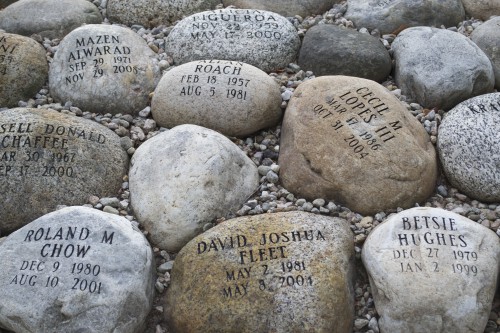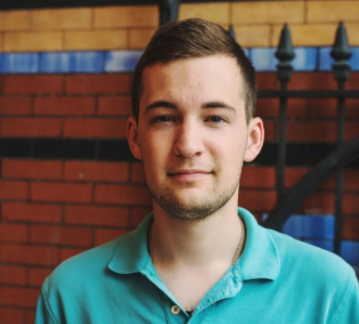“You alright?” a young woman asked a small, older woman by her side.
“Yeah, I guess so,” the older woman exhaled, sighing and squeezing the younger woman’s hand. Both stared at a name carved into stone at the Garden of Peace, a solemn memorial to Boston’s victims of violence, nestled between the structural skeleton that is 20 Somerset, Suffolk’s academic building that will be ready for use in the fall of 2015, and surrounding high-rise office towers.
Their moment mirrored many others that evening, as people congregated in the Garden last Thursday to remember loved ones and friends, both mourning their loss and celebrating their lives. At the start, it was hard to gauge whether the event was more mournful than celebratory. Like the temperature that evening — not too hot or too cold — the event’s atmosphere was an appropriate, comfortable balance between the two.
“You’ll never see this mix of people anywhere else,” said Jude Vajda, whose sister Bernadette is one of the Garden’s founders. Vajda said their father was murdered 15 years ago. “Violence and homicide don’t discriminate.”

Mourners were joined by Boston police officers and detectives, those in charge of keeping the city safe and investigating crimes. Boston Police Commissioner and Suffolk alumnus William Evans entered the crowd alone in a blue civilian suit. He quietly surveyed the mourners, and made his way over to an acquaintance off to the sidelines before taking a seat next to Attorney General and gubernatorial candidate,Martha Coakley.
Chair of the Garden’s Board of Directors Leah Green stood at a podium on a patch of grass surrounded by an imposing black marble wall. The audience faced her. Last year, there were 862 victims’ names in the Garden.
“This year, the number is 901,” Green said. A woman shook her head in dismay. Like many in the crowd, she could not contain her astonishment.
“This Garden is more than a place, it’s an idea,” Martha Coakley, who followed Green, said. “It is also a special remembrance to [victims of] unsolved homicide.” The line resonated deeply with many in the crowd, who nodded their heads in agreement.
Coakley introduced Will Morales, the executive director of Boston’s YMCA Achievers and the Eagleston Square Youth Center in Roxbury.
“I was raised in violence, my career works with violence, and too many children are growing up in it,” Morales said. Raised in a family where his father beat his mother, Morales also witnessed his uncle’s murder at age eight.
“I was standing so close to [my uncle when he was shot] that some of his body tissue ended up on my face,” Morales said.
The Garden, Morales said, “Celebrates both the victims of violence, and those who champion against it.”
“Look around you,” Morales said. He was serious, and he made sure that the crowd stood up and greeted those sitting near them. “You are not alone. Most importantly, this is your healing community.”
Annie Cox, a Boston police officer, followed Morales at the podium. Cox’s son, Dana, was murdered in 1990 over a middle school fight that took place five years earlier. His killer is serving life in prison without chance of parole.
“We are members of a club that we did not sign up for,” Cox said of the parents, friends, and relatives of violence victims. Cox noted that two mothers lost their sons, her and the mother of Dana’s murderer.
“This Garden lets us come together, and deal with our grief in a constructive use,” Cox said.
“[The Garden of Peace] are advocates for a very somber and important issue and that is addressing the violence in our society and honoring the victims it often claims.” Suffolk’s Vice President of Government and Community Affairs John Nucci told the Journal in a phone interview a few hours before the memorial service. Nucci, who serves as Suffolk’s representative on the Garden’s Board of Director’s, said that Suffolk donated food to the candlelight ceremony and worked closely with them as the school planned 20 Somerset.
“I hope that once 20 Somerset is opened we can better integrate students with the Garden and its programming, and find ways for our students to spread its message,” Nucci said, calling the Garden an inspirational location. “It’d be a wonderful collaboration.”




















